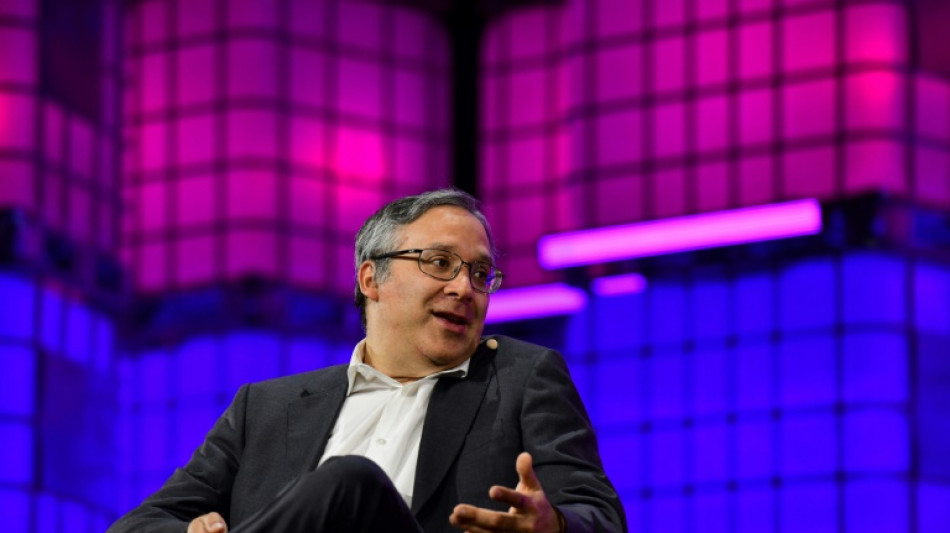
-
 England captain Itoje savours 'special' New Zealand win
England captain Itoje savours 'special' New Zealand win
-
Wales's Evans denies Japan historic win with last-gasp penalty

-
 Zelensky renews calls for more air defence after deadly strike on Kyiv
Zelensky renews calls for more air defence after deadly strike on Kyiv
-
NBA's struggling Pelicans sack coach Willie Green

-
 Petain tribute comments raise 'revisionist' storm in France
Petain tribute comments raise 'revisionist' storm in France
-
Spain on World Cup brink as Belgium also made to wait

-
 Spain virtually seal World Cup qualification in Georgia romp
Spain virtually seal World Cup qualification in Georgia romp
-
M23, DR Congo sign new peace roadmap in Doha

-
 Estevao, Casemiro on target for Brazil in Senegal win
Estevao, Casemiro on target for Brazil in Senegal win
-
Ford steers England to rare win over New Zealand

-
 Massive march in Brazil marks first big UN climate protest in years
Massive march in Brazil marks first big UN climate protest in years
-
Spain rescues hundreds of exotic animals from unlicensed shelter

-
 Huge fire sparked by explosions near Argentine capital 'contained'
Huge fire sparked by explosions near Argentine capital 'contained'
-
South Africa defy early red card to beat battling Italy

-
 Sinner beats De Minaur to reach ATP Finals title match
Sinner beats De Minaur to reach ATP Finals title match
-
Zelensky vows overhaul of Ukraine's scandal-hit energy firms

-
 South Africa defy early red card to beat Italy
South Africa defy early red card to beat Italy
-
Alex Marquez claims Valencia MotoGP sprint victory

-
 McIlroy shares lead with Race to Dubai title in sight
McIlroy shares lead with Race to Dubai title in sight
-
Climate protesters rally in Brazil at COP30 halfway mark

-
 Spike Lee gifts pope Knicks jersey as pontiff meets film stars
Spike Lee gifts pope Knicks jersey as pontiff meets film stars
-
BBC caught in crossfire of polarised political and media landscape

-
 'Happy' Shiffrin dominates in Levi slalom for 102nd World Cup win
'Happy' Shiffrin dominates in Levi slalom for 102nd World Cup win
-
Palestinian national team on 'mission' for peace in Spain visit

-
 Brazilian 'Superman' cheers child cancer patients in Ghana
Brazilian 'Superman' cheers child cancer patients in Ghana
-
India close in on win over South Africa after Jadeja heroics

-
 Huge explosions rock industrial area near Argentina's capital
Huge explosions rock industrial area near Argentina's capital
-
Bezzecchi takes pole for Valencia sprint and MotoGP

-
 Dominant Shiffrin leads after first slalom run in Levi
Dominant Shiffrin leads after first slalom run in Levi
-
Nine killed in accidental explosion at Indian Kashmir police station

-
 Climate protesters to rally at COP30's halfway mark
Climate protesters to rally at COP30's halfway mark
-
Fighting South Africa lose Rickelton after India 189 all out

-
 Harmer leads South Africa fightback as India 189 all out
Harmer leads South Africa fightback as India 189 all out
-
Prison looms for Brazil's Bolsonaro after court rejects his appeal

-
 EU bows to pressure on loosening AI, privacy rules
EU bows to pressure on loosening AI, privacy rules
-
India close in on lead despite South African strikes

-
 Curry's 49 points propel Warriors in 109-108 win over Spurs
Curry's 49 points propel Warriors in 109-108 win over Spurs
-
NZ boxer Parker denies taking banned substance after failed test

-
 Australia setback as Hazlewood ruled out of 1st Ashes Test
Australia setback as Hazlewood ruled out of 1st Ashes Test
-
Australia pace spearhead Josh Hazlewood ruled out of 1st Ashes Test

-
 UN Security Council to vote Monday on Trump Gaza plan
UN Security Council to vote Monday on Trump Gaza plan
-
Japan's Tomono leads after men's short program at Skate America

-
 China tells citizens to avoid Japan travel as Taiwan row grows
China tells citizens to avoid Japan travel as Taiwan row grows
-
Purdue Pharma to be dissolved as US judge says to approve bankruptcy

-
 Iran's first woman orchestra conductor inspires
Iran's first woman orchestra conductor inspires
-
Wood gets all-clear in boost for England

-
 Golf's world No. 8 Thomas has back surgery
Golf's world No. 8 Thomas has back surgery
-
Rebooted Harlem museum celebrates rise of Black art

-
 'Desperation in the air': immigrant comics skewer Trump crackdown
'Desperation in the air': immigrant comics skewer Trump crackdown
-
UN regulator says shipping still wants to decarbonize -- despite US threats


Generative AI's most prominent skeptic doubles down
Two and a half years since ChatGPT rocked the world, scientist and writer Gary Marcus still remains generative artificial intelligence's great skeptic, playing a counter-narrative to Silicon Valley's AI true believers.
Marcus became a prominent figure of the AI revolution in 2023, when he sat beside OpenAI chief Sam Altman at a Senate hearing in Washington as both men urged politicians to take the technology seriously and consider regulation.
Much has changed since then. Altman has abandoned his calls for caution, instead teaming up with Japan's SoftBank and funds in the Middle East to propel his company to sky-high valuations as he tries to make ChatGPT the next era-defining tech behemoth.
"Sam's not getting money anymore from the Silicon Valley establishment," and his seeking funding from abroad is a sign of "desperation," Marcus told AFP on the sidelines of the Web Summit in Vancouver, Canada.
Marcus's criticism centers on a fundamental belief: generative AI, the predictive technology that churns out seemingly human-level content, is simply too flawed to be transformative.
The large language models (LLMs) that power these capabilities are inherently broken, he argues, and will never deliver on Silicon Valley's grand promises.
"I'm skeptical of AI as it is currently practiced," he said. "I think AI could have tremendous value, but LLMs are not the way there. And I think the companies running it are not mostly the best people in the world."
His skepticism stands in stark contrast to the prevailing mood at the Web Summit, where most conversations among 15,000 attendees focused on generative AI's seemingly infinite promise.
Many believe humanity stands on the cusp of achieving super intelligence or artificial general intelligence (AGI) technology that could match and even surpass human capability.
That optimism has driven OpenAI's valuation to $300 billion, unprecedented levels for a startup, with billionaire Elon Musk's xAI racing to keep pace.
Yet for all the hype, the practical gains remain limited.
The technology excels mainly at coding assistance for programmers and text generation for office work. AI-created images, while often entertaining, serve primarily as memes or deepfakes, offering little obvious benefit to society or business.
Marcus, a longtime New York University professor, champions a fundamentally different approach to building AI -- one he believes might actually achieve human-level intelligence in ways that current generative AI never will.
"One consequence of going all-in on LLMs is that any alternative approach that might be better gets starved out," he explained.
This tunnel vision will "cause a delay in getting to AI that can help us beyond just coding -- a waste of resources."
- 'Right answers matter' -
Instead, Marcus advocates for neurosymbolic AI, an approach that attempts to rebuild human logic artificially rather than simply training computer models on vast datasets, as is done with ChatGPT and similar products like Google's Gemini or Anthropic's Claude.
He dismisses fears that generative AI will eliminate white-collar jobs, citing a simple reality: "There are too many white-collar jobs where getting the right answer actually matters."
This points to AI's most persistent problem: hallucinations, the technology's well-documented tendency to produce confident-sounding mistakes.
Even AI's strongest advocates acknowledge this flaw may be impossible to eliminate.
Marcus recalls a telling exchange from 2023 with LinkedIn founder Reid Hoffman, a Silicon Valley heavyweight: "He bet me any amount of money that hallucinations would go away in three months. I offered him $100,000 and he wouldn't take the bet."
Looking ahead, Marcus warns of a darker consequence once investors realize generative AI's limitations. Companies like OpenAI will inevitably monetize their most valuable asset: user data.
"The people who put in all this money will want their returns, and I think that's leading them toward surveillance," he said, pointing to Orwellian risks for society.
"They have all this private data, so they can sell that as a consolation prize."
Marcus acknowledges that generative AI will find useful applications in areas where occasional errors don't matter much.
"They're very useful for auto-complete on steroids: coding, brainstorming, and stuff like that," he said.
"But nobody's going to make much money off it because they're expensive to run, and everybody has the same product."
S.Abdullah--SF-PST



